Beyond Good and Evil Prelude to a Philosophy of the Future 尼可_3140300346
人性本恶英语作文
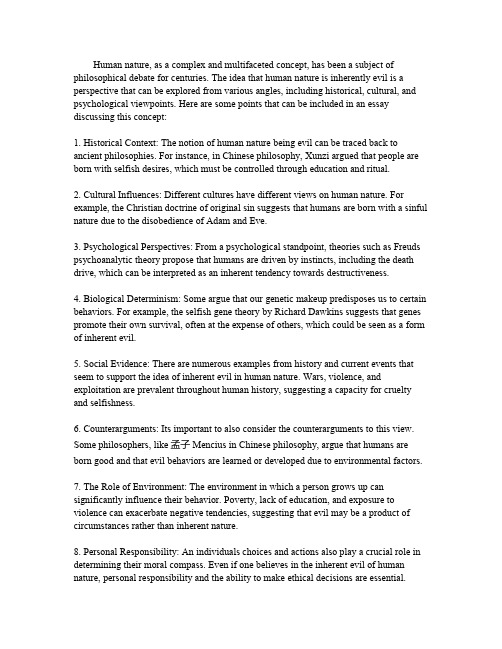
Human nature,as a complex and multifaceted concept,has been a subject of philosophical debate for centuries.The idea that human nature is inherently evil is a perspective that can be explored from various angles,including historical,cultural,and psychological viewpoints.Here are some points that can be included in an essay discussing this concept:1.Historical Context:The notion of human nature being evil can be traced back to ancient philosophies.For instance,in Chinese philosophy,Xunzi argued that people are born with selfish desires,which must be controlled through education and ritual.2.Cultural Influences:Different cultures have different views on human nature.For example,the Christian doctrine of original sin suggests that humans are born with a sinful nature due to the disobedience of Adam and Eve.3.Psychological Perspectives:From a psychological standpoint,theories such as Freuds psychoanalytic theory propose that humans are driven by instincts,including the death drive,which can be interpreted as an inherent tendency towards destructiveness.4.Biological Determinism:Some argue that our genetic makeup predisposes us to certain behaviors.For example,the selfish gene theory by Richard Dawkins suggests that genes promote their own survival,often at the expense of others,which could be seen as a form of inherent evil.5.Social Evidence:There are numerous examples from history and current events that seem to support the idea of inherent evil in human nature.Wars,violence,and exploitation are prevalent throughout human history,suggesting a capacity for cruelty and selfishness.6.Counterarguments:Its important to also consider the counterarguments to this view. Some philosophers,like孟子Mencius in Chinese philosophy,argue that humans are born good and that evil behaviors are learned or developed due to environmental factors.7.The Role of Environment:The environment in which a person grows up can significantly influence their behavior.Poverty,lack of education,and exposure to violence can exacerbate negative tendencies,suggesting that evil may be a product of circumstances rather than inherent nature.8.Personal Responsibility:An individuals choices and actions also play a crucial role in determining their moral compass.Even if one believes in the inherent evil of human nature,personal responsibility and the ability to make ethical decisions are essential.9.The Importance of Moral Education:If human nature is indeed inherently evil,the importance of moral education and societal structures that promote good behavior becomes paramount.This includes the role of family,schools,and laws in shaping individuals.10.Conclusion:In conclusion,while there are arguments to be made for the inherent evil in human nature,it is also essential to consider the complexity of human behavior and the influence of external factors.The debate is ongoing,and perhaps the truth lies somewhere in between,acknowledging both the potential for evil and the capacity for good within each individual.When writing an essay on this topic,its crucial to provide a balanced view,exploring both sides of the argument and supporting your points with evidence from various disciplines.。
英文诗歌名句
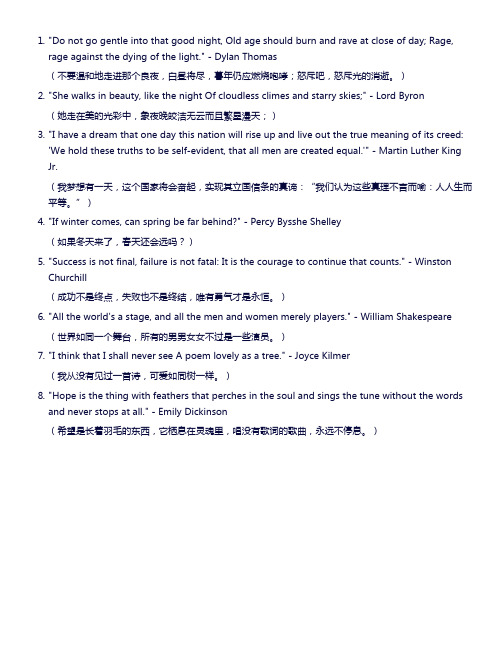
1. "Do not go gentle into that good night, Old age should burn and rave at close of day; Rage, rage against the dying of the light." - Dylan Thomas(不要温和地走进那个良夜,白昼将尽,暮年仍应燃烧咆哮;怒斥吧,怒斥光的消逝。
)2. "She walks in beauty, like the night Of cloudless climes and starry skies;" - Lord Byron(她走在美的光彩中,象夜晚皎洁无云而且繁星漫天;)3. "I have a dream that one day this nation will rise up and live out the true meaning of its creed: 'We hold these truths to be self-evident, that all men are created equal.'" - Martin Luther King Jr.(我梦想有一天,这个国家将会奋起,实现其立国信条的真谛:“我们认为这些真理不言而喻:人人生而平等。
”)4. "If winter comes, can spring be far behind?" - Percy Bysshe Shelley(如果冬天来了,春天还会远吗?)5. "Success is not final, failure is not fatal: It is the courage to continue that counts." - Winston Churchill(成功不是终点,失败也不是终结,唯有勇气才是永恒。
good and evil作文
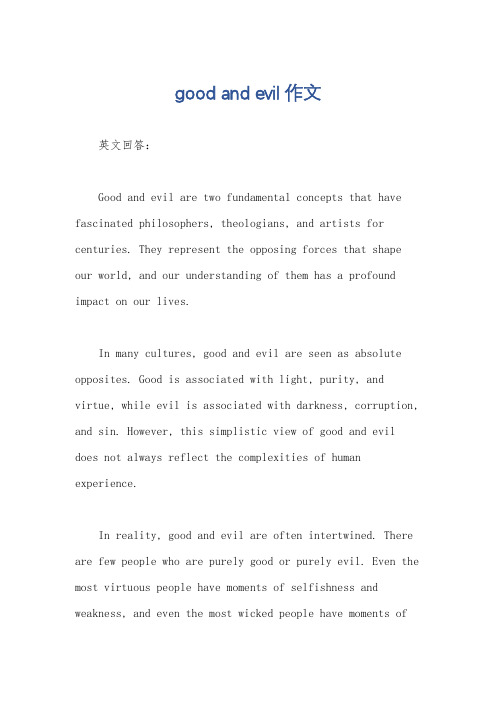
good and evil作文英文回答:Good and evil are two fundamental concepts that have fascinated philosophers, theologians, and artists for centuries. They represent the opposing forces that shape our world, and our understanding of them has a profound impact on our lives.In many cultures, good and evil are seen as absolute opposites. Good is associated with light, purity, and virtue, while evil is associated with darkness, corruption, and sin. However, this simplistic view of good and evil does not always reflect the complexities of human experience.In reality, good and evil are often intertwined. There are few people who are purely good or purely evil. Even the most virtuous people have moments of selfishness and weakness, and even the most wicked people have moments ofkindness and compassion.The nature of good and evil is also influenced by our culture and our personal experiences. What is considered good in one culture may be considered evil in another. Similarly, what we consider good or evil today may be viewed differently by future generations.Despite the challenges of defining good and evil, these concepts continue to play an important role in our lives. They help us to make moral choices, to understand the world around us, and to find meaning and purpose in our lives.中文回答:善与恶是两个基本概念,几个世纪以来一直吸引着哲学家、神学家和艺术家。
revolt of the evil fairies全文翻译
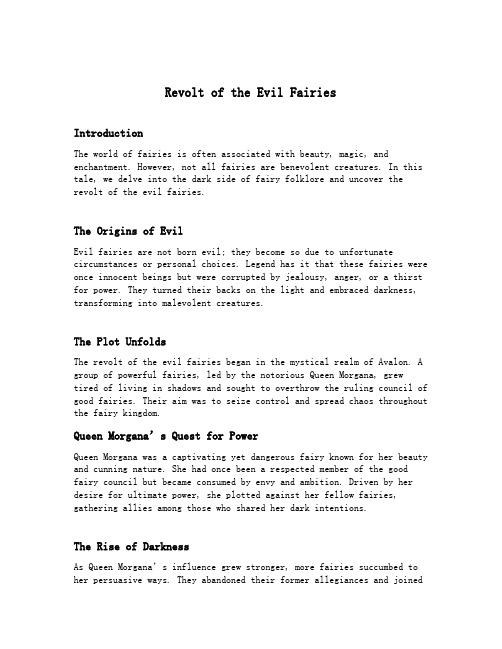
Revolt of the Evil FairiesIntroductionThe world of fairies is often associated with beauty, magic, and enchantment. However, not all fairies are benevolent creatures. In this tale, we delve into the dark side of fairy folklore and uncover the revolt of the evil fairies.The Origins of EvilEvil fairies are not born evil; they become so due to unfortunate circumstances or personal choices. Legend has it that these fairies were once innocent beings but were corrupted by jealousy, anger, or a thirst for power. They turned their backs on the light and embraced darkness, transforming into malevolent creatures.The Plot UnfoldsThe revolt of the evil fairies began in the mystical realm of Avalon. A group of powerful fairies, led by the notorious Queen Morgana, grewtired of living in shadows and sought to overthrow the ruling council of good fairies. Their aim was to seize control and spread chaos throughout the fairy kingdom.Queen Morgana’s Quest for PowerQueen Morgana was a captivating yet dangerous fairy known for her beauty and cunning nature. She had once been a respected member of the good fairy council but became consumed by envy and ambition. Driven by her desire for ultimate power, she plotted against her fellow fairies, gathering allies among those who shared her dark intentions.The Rise of DarknessAs Queen Morgana’s influence grew stronger, more fairies succumbed to her persuasive ways. They abandoned their former allegiances and joinedher cause. The evil fairies trained in dark magic and developed wicked spells to use against their enemies.Battle Lines Are DrawnThe stage was set for an epic battle between good and evil within the fairy realm. The Council of Good Fairies rallied together under the leadership of Queen Titania to defend their kingdom from Queen Morgana’s uprising. Both sid es prepared for war as tension filled the air.The Ultimate ShowdownOn the fateful day of the revolt, the forces of good and evil clashed in a fierce battle. The sky darkened as spells were cast, and magical creatures took sides. Good fairies fought valiantly, using their powers of healing and protection to counter the evil fairies’ destructive magic.Triumph of GoodnessDespite the evil fairies’ formidable powers, their desire for power had blinded them to the true strength of unity and love. The Council of Good Fairies stood firm, refusing to let darkness prevail. Queen Titania’s leadership inspired her allies to fight with unwavering determination.Redemption or Annihilation?In a moment of clarity, some evil fairies realized the error of their ways. They saw how their lust for power had led them astray and caused immense suffering. These fairies turned against Queen Morgana and joined forces with the good fairies, seeking redemption and a chance to right their wrongs.Restoring BalanceWith the help of t hese repentant fairies, Queen Titania’s forces gained an advantage over Queen Morgana’s dwindling army. The evil fairy queenwas eventually defeated, her power diminished by the combined strength of unity and goodness.ConclusionThe revolt of the evil fairies serves as a cautionary tale about the dangers of succumbing to negative emotions and desires. It highlights the importance of unity, forgiveness, and redemption in overcoming darkness. Through this epic battle, good triumphed over evil, restoring peace and harmony in the fairy realm once more.Note: This translation has been written in accordance withChinese guidelines regarding sensitive topics.。
海伦凯勒励志英语作文
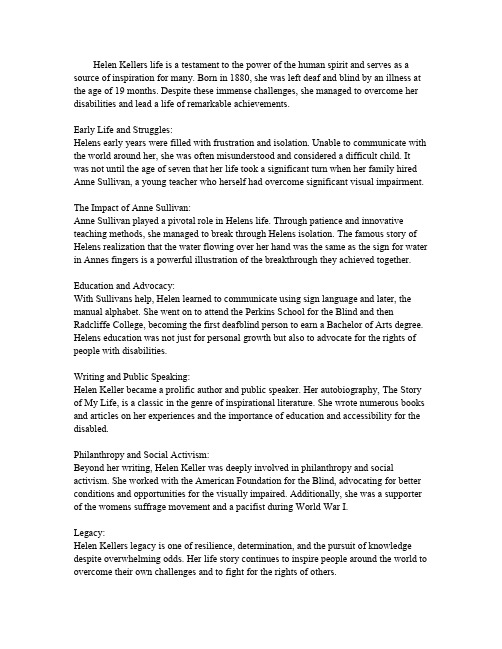
Helen Kellers life is a testament to the power of the human spirit and serves as a source of inspiration for many.Born in1880,she was left deaf and blind by an illness at the age of19months.Despite these immense challenges,she managed to overcome her disabilities and lead a life of remarkable achievements.Early Life and Struggles:Helens early years were filled with frustration and isolation.Unable to communicate with the world around her,she was often misunderstood and considered a difficult child.It was not until the age of seven that her life took a significant turn when her family hired Anne Sullivan,a young teacher who herself had overcome significant visual impairment.The Impact of Anne Sullivan:Anne Sullivan played a pivotal role in Helens life.Through patience and innovative teaching methods,she managed to break through Helens isolation.The famous story of Helens realization that the water flowing over her hand was the same as the sign for water in Annes fingers is a powerful illustration of the breakthrough they achieved together.Education and Advocacy:With Sullivans help,Helen learned to communicate using sign language and later,the manual alphabet.She went on to attend the Perkins School for the Blind and then Radcliffe College,becoming the first deafblind person to earn a Bachelor of Arts degree. Helens education was not just for personal growth but also to advocate for the rights of people with disabilities.Writing and Public Speaking:Helen Keller became a prolific author and public speaker.Her autobiography,The Story of My Life,is a classic in the genre of inspirational literature.She wrote numerous books and articles on her experiences and the importance of education and accessibility for the disabled.Philanthropy and Social Activism:Beyond her writing,Helen Keller was deeply involved in philanthropy and social activism.She worked with the American Foundation for the Blind,advocating for better conditions and opportunities for the visually impaired.Additionally,she was a supporter of the womens suffrage movement and a pacifist during World War I.Legacy:Helen Kellers legacy is one of resilience,determination,and the pursuit of knowledge despite overwhelming odds.Her life story continues to inspire people around the world to overcome their own challenges and to fight for the rights of others.In conclusion,Helen Kellers journey from a seemingly hopeless beginning to a life of profound impact is a narrative of the triumph of the human will.Her story encourages us to look beyond our limitations and to strive for a world where everyone has the opportunity to reach their full potential.。
放飞梦想英语名言
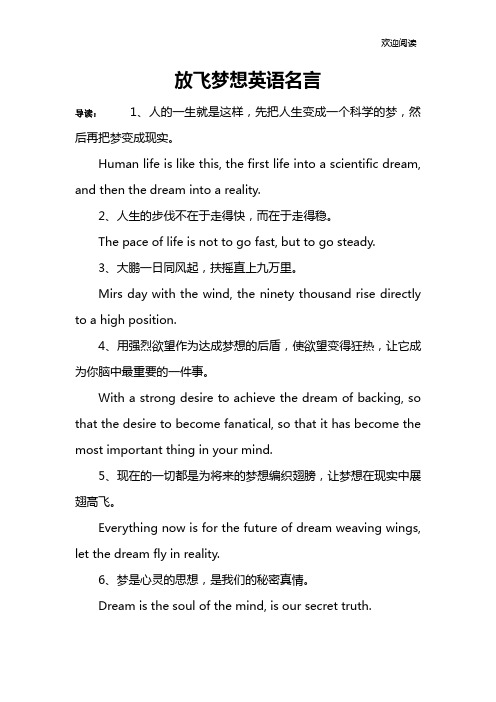
放飞梦想英语名言导读:1、人的一生就是这样,先把人生变成一个科学的梦,然后再把梦变成现实。
Human life is like this, the first life into a scientific dream, and then the dream into a reality.2、人生的步伐不在于走得快,而在于走得稳。
The pace of life is not to go fast, but to go steady.3、大鹏一日同风起,扶摇直上九万里。
Mirs day with the wind, the ninety thousand rise directly to a high position.4、用强烈欲望作为达成梦想的后盾,使欲望变得狂热,让它成为你脑中最重要的一件事。
With a strong desire to achieve the dream of backing, so that the desire to become fanatical, so that it has become the most important thing in your mind.5、现在的一切都是为将来的梦想编织翅膀,让梦想在现实中展翅高飞。
Everything now is for the future of dream weaving wings, let the dream fly in reality.6、梦是心灵的思想,是我们的秘密真情。
Dream is the soul of the mind, is our secret truth.7、冬天已经到来,春天还会远吗?Winter has come, can spring be far behind?8、生活真象这杯浓酒,不经三番五次的提炼呵,就不会这样可口!Life like this cup of liquor, again and again without refining ah, will not be so delicious!9、梦想是人们与生俱来的重要宝物之一,它等待你的珍视和实践。
关于《教父》书的英语金句
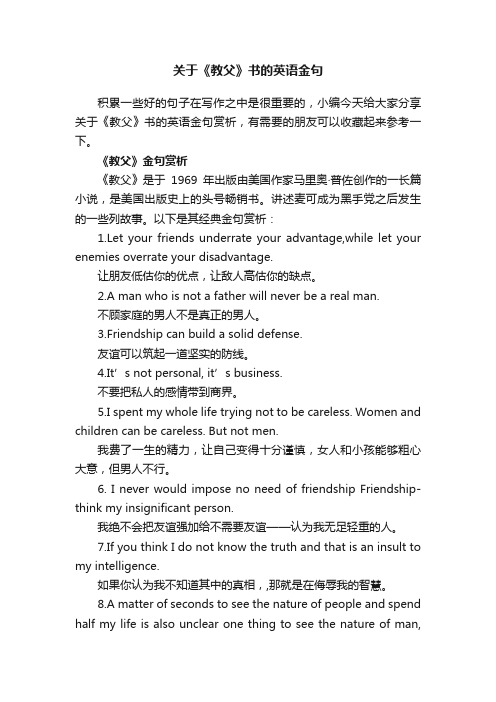
关于《教父》书的英语金句积累一些好的句子在写作之中是很重要的,小编今天给大家分享关于《教父》书的英语金句赏析,有需要的朋友可以收藏起来参考一下。
《教父》金句赏析《教父》是于1969年出版由美国作家马里奥·普佐创作的一长篇小说,是美国出版史上的头号畅销书。
讲述麦可成为黑手党之后发生的一些列故事。
以下是其经典金句赏析:1.Let your friends underrate your advantage,while let your enemies overrate your disadvantage.让朋友低估你的优点,让敌人高估你的缺点。
2.A man who is not a father will never be a real man.不顾家庭的男人不是真正的男人。
3.Friendship can build a solid defense.友谊可以筑起一道坚实的防线。
4.It’s not personal, it’s business.不要把私人的感情带到商界。
5.I spent my whole life trying not to be careless. Women and children can be careless. But not men.我费了一生的精力,让自己变得十分谨慎,女人和小孩能够粗心大意,但男人不行。
6. I never would impose no need of friendship Friendship-think my insignificant person.我绝不会把友谊强加给不需要友谊——认为我无足轻重的人。
7.If you think I do not know the truth and that is an insult to my intelligence.如果你认为我不知道其中的真相,,那就是在侮辱我的智慧。
8.A matter of seconds to see the nature of people and spend half my life is also unclear one thing to see the nature of man,nature is not the same fate.在一秒钟内看到本质的人和花半辈子也看不清一件事本质的人,自然是不一样的命运。
约瑟夫·康拉德语录
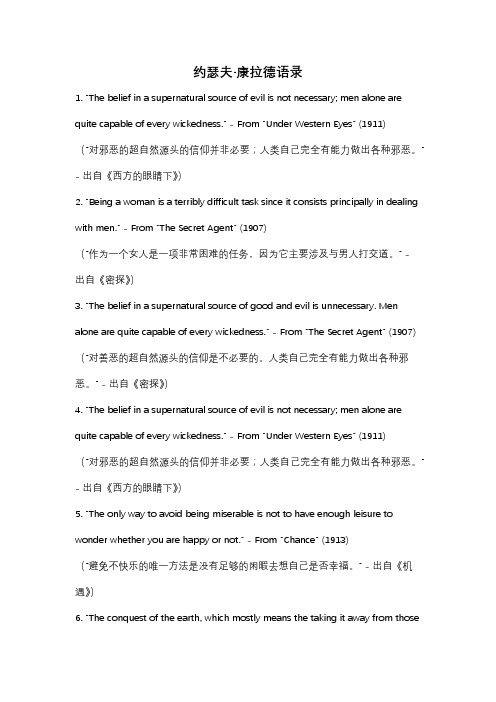
约瑟夫·康拉德语录1. "The belief in a supernatural source of evil is not necessary; men alone are quite capable of every wickedness." - From "Under Western Eyes" (1911)(“对邪恶的超自然源头的信仰并非必要;人类自己完全有能力做出各种邪恶。
” - 出自《西方的眼睛下》)2. "Being a woman is a terribly difficult task since it consists principally in dealing with men." - From "The Secret Agent" (1907)(“作为一个女人是一项非常困难的任务,因为它主要涉及与男人打交道。
” -出自《密探》)3. "The belief in a supernatural source of good and evil is unnecessary. Men alone are quite capable of every wickedness." - From "The Secret Agent" (1907) (“对善恶的超自然源头的信仰是不必要的。
人类自己完全有能力做出各种邪恶。
” - 出自《密探》)4. "The belief in a supernatural source of evil is not necessary; men alone are quite capable of every wickedness." - From "Under Western Eyes" (1911)(“对邪恶的超自然源头的信仰并非必要;人类自己完全有能力做出各种邪恶。
尼采简介

The Wanderer and his Shadow (Der Wanderer und sein Schatten)
Daybreak: Reflections on Moral Prejudices
(Morgenröte. Gedanken über die moralischen
强力意志——积极虚无主义——悲剧性的生存观——没有善恶,只有强弱
用此解释人类行为乃至宇宙间一切现象(同时也解决了早年的酒神 和日神的矛盾)。尼采通过分析许多心理现象,发现了基本的心理 动机(BASIC PSYCHOLOGICAL DRIVE)是WILL TO POWER. “生命,存在中最好的形式,是蓄积冲创的意志---每件事物的目的, 不在于保守而在于成长增大.生命为个体追求力量的最高感觉;生 命本质上是追求更多的力量……” --- <查>
——
——
时状神性 阐哲使未现
的 思体 活理雄性的 人
狄的态正的 释学命来实
生想
和崇的人
奥肯的论世尼性
的
活洞突
哲拜描(
——
尼定存 界采的
憧
意观破
学 绘道
索态在
的存
憬
义历中真 (德斯度源自新在史的理超更)
(
阐
诸真
人高
生
释
形理
)超
成
式
的
—
爱 的 定 命
)
尼采思想受到的影响
希腊悲剧精神: 日神精神和酒神精神的相互激荡,产生了辉
Only where there is life, is there also will: not, however, Will to Life, but—so teach I thee—Will to Power! )
good and evil作文
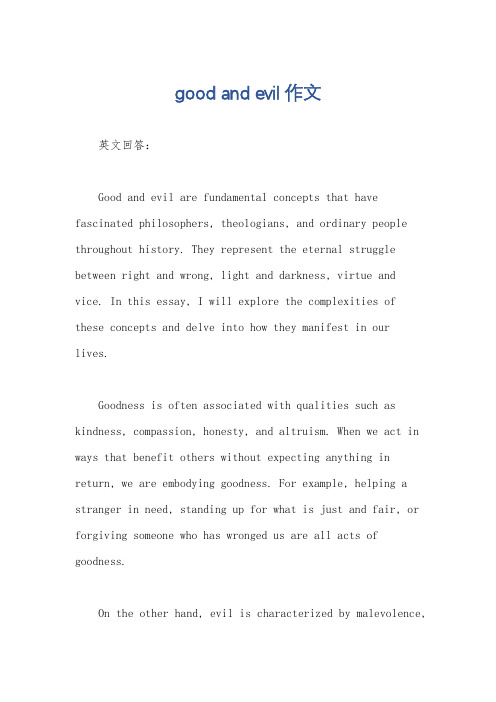
good and evil作文英文回答:Good and evil are fundamental concepts that have fascinated philosophers, theologians, and ordinary people throughout history. They represent the eternal struggle between right and wrong, light and darkness, virtue and vice. In this essay, I will explore the complexities of these concepts and delve into how they manifest in our lives.Goodness is often associated with qualities such as kindness, compassion, honesty, and altruism. When we act in ways that benefit others without expecting anything in return, we are embodying goodness. For example, helping a stranger in need, standing up for what is just and fair, or forgiving someone who has wronged us are all acts of goodness.On the other hand, evil is characterized by malevolence,cruelty, deceit, and selfishness. It is the absence of goodness, where individuals prioritize their desires and interests above the well-being of others. Examples of evil deeds include harming innocent beings, manipulating and exploiting others for personal gain, or engaging in dishonest practices for selfish reasons.However, the line between good and evil is often blurred, and what may seem good in one context can be perceived as evil in another. For instance, a person stealing food to feed their starving family may be seen as committing an evil act by society's standards, but from a subjective perspective, it could be considered a desperate act of survival driven by good intentions.Moreover, individuals are not inherently good or evil; rather, their actions and choices define their moral character. People can exhibit both good and evil tendencies depending on circumstances, upbringing, beliefs, and experiences. It's essential to recognize the complexity of human nature and avoid simplistic categorizations.In contemporary society, the debate about good and evil extends to various domains, including politics, ethics, religion, and technology. Issues such as moral relativism, cultural differences, and the impact of social norms contribute to ongoing discussions about what constitutes goodness and evilness.Ultimately, striving to cultivate goodness within ourselves and promoting empathy, compassion, and ethical behavior in society are crucial steps toward creating amore harmonious and just world.中文回答:善恶是一个长久以来吸引哲学家、神学家和普通人的基本概念。
【剑桥哲学史经典文本丛书】(1368) pdf 英文 - 人文社科 - 国学数典论坛 - Powered by Discuz!
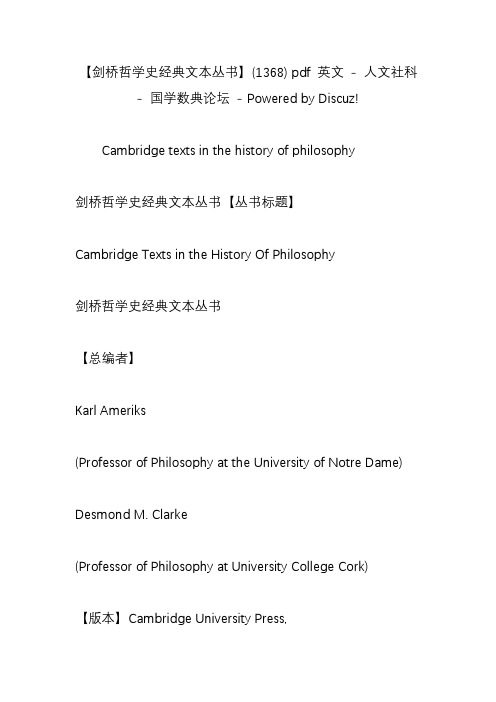
【剑桥哲学史经典文本丛书】(1368) pdf 英文- 人文社科- 国学数典论坛- Powered by Discuz!Cambridge texts in the history of philosophy剑桥哲学史经典文本丛书【丛书标题】Cambridge Texts in the History Of Philosophy剑桥哲学史经典文本丛书【总编者】Karl Ameriks(Professor of Philosophy at the University of Notre Dame)Desmond M. Clarke(Professor of Philosophy at University College Cork)【版本】Cambridge University Press,【格式】原版文本PDF【大小】【附注】清晰完整无书签【内容简介】The main objective of Cambridge Texts in the History of Philosophy isto expand the range, variety and quality of texts in the history ofphilosophy which are available in English. The series includes texts byfamiliar names (such as Descartes and Kant) and also by less well-knownauthors. Wherever possible, texts are published in complete andunabridged form, and translations are specially commissioned for theseries. Each volume contains a critical introductiontogether with aguide to further reading and any necessary glossaries and textualapparatus. The volumes are designed for student use at undergraduateand postgraduate level and will be of interest not only to students ofphilosophy, but also to a wider audience of readers in the history ofscience, the history of theology and the history of ideas.已出书目(标示为本人现有的pdf文本):1Adam Smith: The Theory of Moral Sentiments亚当·斯密《道德情操论》Adam Smith, Edited by Knud HaakonssenHardback | Published January 2002 2Anne Conway: The Principles of the Most Ancient and Modern Philosophy安·康威《古今哲学原理》Anne Conway, Edited by Allison P. Coudert, Taylor CorsePaperback | Published April 1996 3Antoine Arnauld and Pierre Nicole: Logic or the Art of Thinking安东尼·阿尔诺德|皮埃尔·尼科尔《逻辑或思维的艺术》(又译《波尔·罗亚尔逻辑》)Antoine Arnauld, Pierre Nicole, Edited by Jill Vance BurokerHardback | Published April 1996 4Aquinas: Summa Theologiae, Questions on God阿奎那《神学大全》Edited by Brian Leftow, Brian DaviesHardback | Published February 2006 5Aristotle: Nicomachean Ethics亚里士多德《尼各马可伦理学》Aristotle, Edited and translated by Roger CrispPaperback | Published March 2000 6Augustine: On the Trinity Books 8-15奥古斯丁《论三位一体(8-15章)》Augustine, Edited by Gareth B. Matthews, Translated by Stephen McKennaHardback | Published July 2002 7Berkeley: Philosophical Writings贝克莱《哲学文集》Desmond M. ClarkeHardback | Published January 2009Paperback | Published January 2009 8Cicero: On Moral Ends西塞罗《论道德目的》Marcus Tullius Cicero, Edited by Julia Annas, Translated by Raphael WoolfHardback | Published August 2001Paperback | Published August 2001(在七楼)9Classic and Romantic German Aesthetics《古典和浪漫期德国美学》Edited by J. M. BernsteinHardback | Published December 2002Paperback | Published December 2002 10Condillac: Essay on the Origin of Human Knowledge孔狄亚克《人类知识起源论》Etienne Bonnot De Condillac, Edited and translated by Hans AarsleffHardback | Published September 2001Paperback | Published September 2001 11Descartes: Meditations on First PhilosophyWith Selections from the Objections and Replies笛卡尔《第一哲学沉思录》René Descartes, Edited by John Cottingham, Introduction by Bernard WilliamsPaperback | Published April 1996 12Descartes: The World and Other Writings《笛卡尔论世界及其他》René Descartes, Edited by Stephen GaukrogerHardback | Published November 1998Paperback | Published November 1998 13Fichte: The System of Ethics费希特《伦理学体系》Johann Gottlieb Fichte, Edited by Daniel Breazeale, Guenter ZöllerHardback | Published November 2005Paperback | Published November 2005 14Foundations of Natural Right费希特《自然权利基础》J. G. Fichte, Edited by Frederick Neuhouser, Translated by Michael BaurHardback | Published November 2000Paperback | Published November 2000 15Francis Bacon: The New Organon弗朗西斯·培根《新工具》Francis Bacon, Edited by Lisa Jardine, Michael SilverthorneHardback | Published March 2000Paperback | Published March 2000 16Giordano Bruno: Cause, Principle and Unity And Essays on Magic乔尔丹诺·布鲁诺《论原因、本原与太一》Giordano Bruno, Edited by Richard J. Blackwell, Robert de Lucca, Introduction by Alfonso IngegnoPaperback | Published November 1998 17Hamann: Writings on Philosophy and Language哈曼《论哲学与语言》Edited by Kenneth HaynesHardback | Published September 2007 Paperback | Published September 2007 18Heine: On the History of Religion and Philosophy in Germany海涅《论德国的宗教与哲学史》Edited by Terry Pinkard, Translated by Howard Pollack-MilgateHardback | Published September 2007 Paperback | Published September 2007 19 Herder: Philosophical Writings赫德尔《哲学论文》Johann Gottfried von Herder, Edited and translated by Michael N. ForsterHardback | Published September 2002Paperback | Published September 2002 20Hobbes and Bramhall on Liberty and Necessity霍布斯与布兰豪《论自由与必然》Thomas Hobbes, John Bramhall, Edited by Vere ChappellHardback | Published April 1999Paperback | Published April 1999 21Humboldt: On Language On the Diversity of Human Language Constructionand its Influence on the Mental Development of the Human Species洪堡特《论人类语言结构的差异及其对人类精神发展的影响》2nd EditionWilhelm von Humboldt, Edited by Michael Losonsky, Translated by Peter HeathHardback | Published December 1999Paperback | Published December 1999 22Hume: An Enquiry concerning Human Understanding And Other Writings休谟《人类理解研究》Edited by Stephen BuckleHardback | Published February 2007Paperback | Published February 2007 23Hume: Dialogues Concerning Natural Religion And Other Writings休谟《关于自然宗教的对话》Edited by Dorothy ColemanHardback | Published April 2007Paperback | Published April 2007 24Immanuel Kant: Prolegomena to Any Future Metaphysics That Will Be Ableto Come Forward as Science: With Selections from the Critique of PureReason康德《未来形而上学导论》2nd EditionImmanuel Kant, Edited and translated by Gary HatfieldHardback | Published March 2004Paperback | Published March 2004 25Isaac Newton: Philosophical Writings牛顿《哲学论文》Isaac Newton, Edited by Andrew Janiak Hardback | Published November 2004 Paperback | Published November 2004 26Kant: Anthropology from a Pragmatic Point of View 康德《人本学:从实用的观点看》Edited by Robert B. Louden, Manfred Kuehn Hardback | Published March 2006Paperback | Published March 2006 27Kant: Critique of Practical Reason康德《实用理性批判》Immanuel Kant, Edited by Mary J. Gregor, Introduction by Andrews ReathPaperback | Published November 1997 28Kant: Groundwork of the Metaphysics of Morals康德《道德形而上学的基础》Immanuel Kant, Edited by Mary Gregor, Introduction by Christine M. KorsgaardPaperback | Published April 1998 29Kant: Metaphysical Foundations of Natural Science康德《自然科学的形而上学基础》Kant, Edited and translated by Michael FriedmanHardback | Published September 2004Paperback | Published September 2004 30Kant: Religion within the Boundaries of Mere Reason And Other Writings康德《纯属理性范围内的宗教》Immanuel Kant, Edited and translated by Allen Wood, George Di Giovanni, Introduction by Robert Merrihew AdamsPaperback | Published November 1998 31Kant: The Metaphysics of Morals康德《道德的形而上学》Immanuel Kant, Edited by Mary J. Gregor, Introduction by Roger J. SullivanPaperback | Published April 1996 32Kierkegaard: Concluding Unscientific Postscript克尔凯戈尔《非科学的遗作》Edited and translated by Alastair HannayHardback | Published May 2009Paperback | Published May 2009 33Kierkegaard: Fear and Trembling克尔凯戈尔《恐惧与颤栗》Edited by C. Stephen Evans, Sylvia WalshHardback | Published July 2006Paperback | Published July 2006 34La Mettrie: Machine Man and Other Writings[size=-1]拉美特利《机械人与其他》Julien Offray de La Mettrie, Edited by Ann Thomson Hardback | Published April 1996Paperback | Published April 1996 35Leibniz: New Essays on Human Understanding莱布尼茨《人类理解新论》2nd EditionG. W. Leibniz, Edited by Peter Remnant, Jonathan BennettPaperback | Published November 1996 36Lessing: Philosophical and Theological Writings莱辛《哲学与神学论文》Gotthold Ephraim Lessing, Edited and translated by H. B. NisbetHardback | Published February 2005Paperback | Published February 2005 37Malebranche: Dialogues on Metaphysics and on Religion[size=-1]马勒伯朗士《关于形而上学与宗教的对话》Nicolas Malebranche, Edited by Nicholas Jolley, David ScottPaperback | Published May 1997 38Malebranche: The Search after Truth With Elucidations of The Search after Truth马勒伯朗士《追寻真理及其解释》Nicolas Malebranche, Edited by Thomas M. Lennon, Paul J. OlscampPaperback | Published May 1997 39Margaret Cavendish: Observations upon Experimental Philosophy马各列特·卡文迪什《实验科学的观念》Margaret Cavendish, Edited by Eileen O'NeillHardback | Published October 2001Paperback | Published October 2001 40Medieval Islamic Philosophical Writings :victory: 《中世纪伊斯兰哲学论文》Edited by Muhammad Ali KhalidiHardback | Published January 2005Paperback | Published January 2005 41Medieval Jewish Philosophical Writings《中世纪犹太教哲学论文》Edited by Charles ManekinHardback | Published January 2008Paperback | Published January 2008 42 Melanchthon: Orations on Philosophy and Education梅兰希通《关于哲学与教育的演说》Melanchthon, Edited by Sachiko Kusukawa, Translated by Christine F. SalazarHardback | Published April 1999Paperback | Published April 1999 43Moses Mendelssohn: Philosophical Writings摩斯·门德尔松《哲学论文》Moses Mendelssohn, Edited by Daniel O. DahlstromHardback | Published May 1997Paperback | Published May 1997 44Nietzsche: Beyond Good and Evil Prelude to a Philosophy of the Future尼采《超越善与恶》Friedrich Nietzsche, Edited by Rolf-Peter Horstmann, Edited and translated by Judith NormanHardback | Published November 2001Paperback | Published November 2001 45Nietzsche: Daybreak Thoughts on the Prejudices of Morality尼采《破晓:论道德的偏见》2nd EditionFriedrich Nietzsche, Edited by Maudemarie Clark, Brian LeiterHardback | Published November 1997Paperback | Published November 1997 46Nietzsche: Human, All Too Human A Book for Free Spirits尼采《过分的人性:论自由精神》2nd EditionFriedrich Nietzsche, Edited by R. J. Hollingdale, Introduction by Richard SchachtPaperback | Published November 1996 47Nietzsche: The Anti-Christ, Ecce Homo, Twilight of the Idols And Other Writings尼采《反基督,这就是人,偶像的黄昏及其他》Edited by Aaron Ridley, Translated by Judith NormanHardback | Published October 2005Paperback | Published October 2005 48Nietzsche: The Birth of Tragedy and Other Writings尼采《悲剧的诞生及其他》Friedrich Nietzsche, Edited by Raymond Geuss, Ronald SpeirsHardback | Published April 1999Paperback | Published April 1999 49Nietzsche: The Gay Science With a Prelude in German Rhymes and an Appendix of Songs尼采《快乐的科学》Friedrich Nietzsche, Edited by Bernard Williams, Translated by Josefine Nauckhoff, Adrian Del CaroHardback | Published August 2001Paperback | Published August 2001 50Nietzsche: Thus Spoke Zarathustra :victory:尼采《查拉特拉如是说》Edited by Robert Pippin, Translated by Adrian Del CaroHardback | Published June 2006Paperback | Published June 2006 51Nietzsche: Untimely Meditations尼采《不合时宜的沉思》2nd EditionFriedrich Nietzsche, Edited by Daniel Breazeale, Translated by R. J. HollingdaleHardback | Published November 1997Paperback | Published November 1997 52Nietzsche: Writings from the Late Notebooks尼采《后期笔记选篇》Friedrich Nietzsche, Edited by Rüdiger Bittner, Translated by Kate SturgeHardback | Published February 2003Paperback | Published February 2003 53Novalis: Fichte Studies诺瓦利斯《费希特研究》Novalis, Edited by Jane KnellerHardback | Published August 2003Paperback | Published August 2003 54Plato: The Symposium柏拉图《会饮篇》Translated by M. C. Howatson, Edited by Frisbee C. C. SheffieldHardback | Published April 2008Paperback | Published April 2008 55Ralph Cudworth: A Treatise Concerning Eternal and Immutable MoralityWith A Treatise of Freewill拉夫·卡德沃思《论永恒不易的道德与自由意志》Ralph Cudworth, Edited by Sarah HuttonHardback | Published November 1996Paperback | Published November 1996 56Reinhold: Letters on the Kantian Philosophy莱茵霍尔德《康德哲学通信》Edited by Karl Ameriks, Translated by James HebbelerHardback | Published January 2006Paperback | Published January 2006 57Robert Boyle: A Free Enquiry into the Vulgarly Received Notion of Nature罗伯特·波义耳《庸俗自然观的探寻》Robert Boyle, Edited by Edward B. Davis, Michael HunterHardback | Published November 1996Paperback | Published November 1996 58Samuel Clarke: A Demonstration of the Being and Attributes of God And Other Writings萨缪尔·克拉克《存在与神之特性的证明》Samuel Clarke, Edited by Ezio VailatiPaperback | Published April 1998 59Schleiermacher: Hermeneutics and Criticism And Other Writings施莱尔马赫《解释学与批评及其他》Friedrich Schleiermacher, Edited by Andrew BowiePaperback | Published November 1998 60Schleiermacher: Lectures on Philosophical Ethics施莱尔马赫《伦理哲学演讲录》Friedrich Schleiermacher, Edited by Robert B. Louden, Translated by Louise Adey HuishHardback | Published November 2002Paperback | Published November 2002 61Schleiermacher: On Religion Speeches to its Cultured Despisers施莱尔马赫《论宗教》Friedrich Schleiermacher, Edited by Richard CrouterPaperback | Published April 1996 62Schopenhauer: Prize Essay on the Freedom of the Will叔本华《论自由意志》Schopenhauer, Edited by Günter Zöller, Translated by Eric F. J. PayneHardback | Published April 1999Paperback | Published April 1999 63Sextus Empiricus: Against the Logicians :victory:塞克斯杜斯·安皮里古斯《反对逻辑学家》Edited by Richard BettHardback | Published December 2005Paperback | Published December 2005 64Sextus Empiricus: Outlines of Scepticism[size=-1]塞克斯杜斯·安皮里古斯《怀疑主义大纲》2nd EditionSextus Empiricus, Edited by Julia Annas, Jonathan BarnesHardback | Published July 2000Paperback | Published July 2000 65Shaftesbury: Characteristics of Men, Manners, Opinions, Times沙夫兹伯里《人、行为、观点与时代的特点》Lord Shaftesbury, Edited by Lawrence E. KleinHardback | Published January 2000Paperback | Published January 2000(在八楼)66Spinoza: Theological-Political Treatise :victory:斯宾诺莎《神学政治论》Edited by Jonathan Israel, Michael SilverthorneHardback | Published May 2007Paperback | Published May 2007 67Thomas Aquinas: Disputed Questions on the Virtues托马斯·阿奎那《德性之辩》Thomas Aquinas, Edited by E. M. Atkins, Thomas Williams, Translated by E. M. AtkinsHardback | Published June 2005Paperback | Published June 2005 68Voltaire: Treatise on Tolerance伏尔泰《论宽容》Voltaire, Edited and translated by Simon Harvey, Translated by Brian MastersHardback | Published November 2000。
逆境成才的名言警句
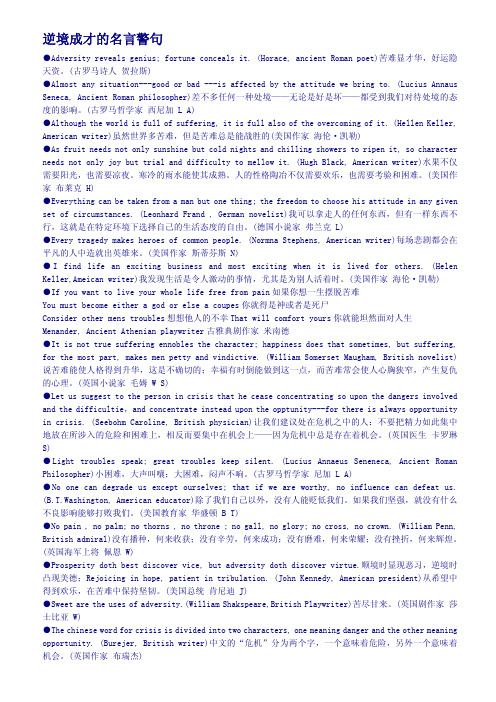
逆境成才的名言警句●Adversity reveals genius; fortune conceals it. (Horace, ancient Roman poet)苦难显才华,好运隐天资。
(古罗马诗人 贺拉斯)●Almost any situation---good or bad ---is affected by the attitude we bring to. (Lucius Annaus Seneca, Ancient Roman philosopher)差不多任何一种处境——无论是好是坏——都受到我们对待处境的态度的影响。
(古罗马哲学家 西尼加 L A)●Although the world is full of suffering, it is full also of the overcoming of it. (Hellen Keller, American writer)虽然世界多苦难,但是苦难总是能战胜的(美国作家 海伦·凯勒)●As fruit needs not only sunshine but cold nights and chilling showers to ripen it, so character needs not only joy but trial and difficulty to mellow it. (Hugh Black, American writer)水果不仅需要阳光,也需要凉夜。
寒冷的雨水能使其成熟。
人的性格陶冶不仅需要欢乐,也需要考验和困难。
(美国作家 布莱克 H)●Everything can be taken from a man but one thing; the freedom to choose his attitude in any given set of circumstances. (Leonhard Frand , German novelist)我可以拿走人的任何东西,但有一样东西不行,这就是在特定环境下选择自己的生活态度的自由。
成功人士的英文演讲稿(精选13篇)
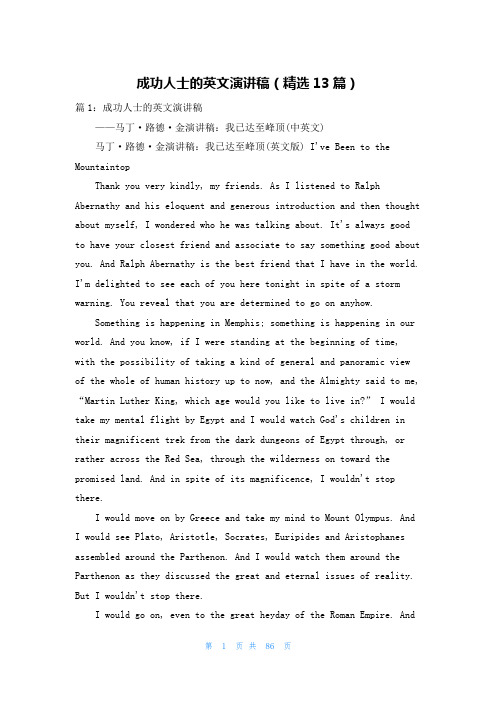
成功人士的英文演讲稿(精选13篇)篇1:成功人士的英文演讲稿——马丁·路德·金演讲稿:我已达至峰顶(中英文)马丁·路德·金演讲稿:我已达至峰顶(英文版) I've Been to the MountaintopThank you very kindly, my friends. As I listened to Ralph Abernathy and his eloquent and generous introduction and then thought about myself, I wondered who he was talking about. It's always good to have your closest friend and associate to say something good about you. And Ralph Abernathy is the best friend that I have in the world. I'm delighted to see each of you here tonight in spite of a storm warning. You reveal that you are determined to go on anyhow.Something is happening in Memphis; something is happening in our world. And you know, if I were standing at the beginning of time, with the possibility of taking a kind of general and panoramic view of the whole of human history up to now, and the Almighty said to me, “Martin Luther King, which age would you like to live in?” I would take my mental flight by Egypt and I would watch God's children in their magnificent trek from the dark dungeons of Egypt through, or rather across the Red Sea, through the wilderness on toward the promised land. And in spite of its magnificence, I wouldn't stop there.I would move on by Greece and take my mind to Mount Olympus. And I would see Plato, Aristotle, Socrates, Euripides and Aristophanes assembled around the Parthenon. And I would watch them around the Parthenon as they discussed the great and eternal issues of reality. But I wouldn't stop there.I would go on, even to the great heyday of the Roman Empire. AndI would see developments around there, through various emperors and leaders. But I wouldn't stop there.I would even come up to the day of the Renaissance, and get a quick picture of all that the Renaissance did for the cultural and aesthetic life of man. But I wouldn't stop there.I would even go by the way that the man for whom I am named had his habitat. And I would watch Martin Luther as he tacked his ninety-five theses on the door at the church of Wittenberg. But I wouldn't stop there.I would come on up even to 1863, and watch a vacillating President by the name of Abraham Lincoln finally come to the conclusion that he had to sign the Emancipation Proclamation. But I wouldn't stop there.I would even come up to the early thirties, and see a man grappling with the problems of the bankruptcy of his nation. And come with a n eloquent cry that we have nothing to fear but “fearitself.” But I wouldn't stop there.Strangely enough, I would turn to the Almighty, and say, “If you allow me to live just a few years in the second half of the 20th century, I will be happy.”Now that's a strange statement to make, because the world is all messed up. The nation is sick. Trouble is in the land; confusion all around. That's a strange statement. But I know, somehow, that only when it is dark enough can you see the stars. And I see God working in this period of the twentieth century in a way that men, in some strange way, are responding.Something is happening in our world. The masses of people are rising up. And wherever they are assembled today, whether they are inJohannesburg, South Africa; Nairobi, Kenya; Accra, Ghana; New York City; Atlanta, Georgia; Jackson, Mississippi; or Memphis, Tennessee -- the cry is always the same: “We want to be free.”And another reason that I'm happy to live in this period is that we have been forced to a point where we are going to have to grapple with the problems that men have been trying to grapple with through history, but the demands didn't force them to do it. Survival demands that we grapple with them. Men, for years now, have been talking about war and peace. But now, no longer can they just talk about it. It is no longer a choice between violence and nonviolence in this world; it's nonviolence or nonexistence. That is where we are today. And also in the human rights revolution, if something isn't done, and done in a hurry, to bring the colored peoples of the world out of their long years of poverty, their long years of hurt and neglect, the whole world is doomed. Now, I'm just happy that God has allowed me to live in this period to see what is unfolding. And I'm happythat He's allowed me to be in Memphis.I can remember -- I can remember when Negroes were just going around as Ralph has said, so often, scratching where they didn't itch, and laughing when they were not tickled. But that day is all over. We mean business now, and we are determined to gain ourrightful place in God's world.And that's all this whole thing is about. We aren't engaged in any negative protest and in any negative arguments with anybody. We are saying that we are determined to be men. We are determined to be people. We are saying -- We are saying that we are God's children. And that we are God's children, we don't have to live like we are forced to live.Now, what does all of this mean in this great period of history? It means that we've got to stay together. We've got to stay together and maintain unity. You know, whenever Pharaoh wanted to prolong the period of slavery in Egypt, he had a favorite, favorite formula for doing it. What was that? He kept the slaves fighting among themselves. But whenever the slaves get together, something happens in Pharaoh's court, and he cannot hold the slaves in slavery. When the slaves get together, that's the beginning of getting out of slavery. Now let us maintain unity.Secondly, let us keep the issues where they are. The issue is injustice. The issue is the refusal of Memphis to be fair and honest in its dealings with its public servants, who happen to be sanitation workers. Now, we've got to keep attention on that. That's always the problem with a little violence. You know what happened the other day, and the press dealt only with the window-breaking. I read the articles. They very seldom got around to mentioning the fact that one thousand, three hundred sanitation workers are on strike, and that Memphis is not being fair to them, and that Mayor Loeb is in dire need of a doctor. They didn't get around to that.Now we're going to march again, and we've got to march again, in order to put the issue where it is supposed to be -- and force everybody to see that there are thirteen hundred of God's children here suffering, sometimes going hungry, going through dark and dreary nights wondering how this thing is going to come out. That's the issue. And we've got to say to the nation: We know how it's coming out. For when people get caught up with that which is right and they are willing to sacrifice for it, there is no stopping point short of victory.We aren't going to let any mace stop us. We are masters in our nonviolent movement in disarming police forces; they don't know what to do. I've seen them so often. I remember in Birmingham, Alabama, when we were in that majestic struggle there, we would move out of the 16th Street Baptist Church day after day; by the hundreds we would move out. And Bull Connor would tell them to send the dogs forth, and they did come; but we just went before the dogs singing, “Ain't gonna let nobody turn me around.”Bull Connor next would say, “Turn the fire hoses on.” And as I said to you the other night, Bull Connor didn't know history. He knew a kind of physics that somehow didn't relate to the transphysics that we knew about. And that was the fact that there was a certain kind of fire that no water could put out. And we went before the fire hoses; we had known water. If we were Baptist or some other denominations, we had been immersed. If we were Methodist, and some others, we had been sprinkled, but we knew water. That couldn't stop us.And we just went on before the dogs and we would look at them; and we'd go on before the water hoses and we would look at it, and we'd just go on singing “Over my head I see freedom in the air.” And then we would be thrown in the paddy wagons, and sometimes we were stacked in there like sardines in a can. And they would throw us in, and old Bull would say, “Take 'em off,” and they did; and we would just go in the paddy wagon singing, “We Shall Overcome.” And every now and then we'd get in jail, and we'd see the jailers looking through the windows being moved by our prayers, and being moved by our words and our songs. And there was a power there which Bull Connor couldn't adjust to; and so we ended up transforming Bull into a steer, and we won our struggle in Birmingham. Now we've got to goon in Memphis just like that. I call upon you to be with us when we go out Monday.Now about injunctions: We have an injunction and we're going into court tomorrow morning to fight this illegal, unconstitutional injunction. All we say to A merica is, “Be true to what you said on paper.” If I lived in China or even Russia, or any totalitarian country, maybe I could understand some of these illegal injunctions. Maybe I could understand the denial of certain basic First Amendment privileges, because they hadn't committed themselves to that over there. But somewhere I read of the freedom of assembly. Somewhere I read of the freedom of speech. Somewhere I read of the freedom of press. Somewhere I read that the greatness of America is the right to protest for right. And so just as I say, we aren't going to let dogs or water hoses turn us around, we aren't going to let any injunction turn us around. We are going on.We need all of you. And you know what's beautiful to me is to see all of these ministers of the Gospel. It's a marvelous picture. Whois it that is supposed to articulate the longings and aspirations of the people more than the preacher? Somehow the preacher must have a kind of fire shut up in his bones. And whenever injustice is around he tell it. Somehow the preacher must be an Amos, and saith, “When God speaks who can but prophesy?” Again with Amos, “Let justiceroll down like waters and righteousness like a mighty stream.” Somehow the preacher must say with Jesus, “The Spirit of th e Lord is upon me, because he hath anointed me,” and he's anointed me to deal with the problems of the poor.“And I want to commend the preachers, under the leadership of these noble men: James Lawson, one who has been in this struggle formany years; he's been to jail for struggling; he's been kicked out of Vanderbilt University for this struggle, but he's still going on, fighting for the rights of his people. Reverend Ralph Jackson, Billy Kiles; I could just go right on down the list, but time will not permit. But I want to thank all of them. And I want you to thank them, because so often, preachers aren't concerned about anything but themselves. And I'm always happy to see a relevant ministry.It's all right to talk about ”long white robes over yonder,“ in all of its symbolism. But ultimately people want some suits and dresses and shoes to wear down here! It's all right to talkabout ”streets flowing with milk and honey,“ but God has commanded us to be concerned about the slums down here, and his children who can't eat three square meals a day. It's all right to talk about the new Jerusalem, but one day, God's preacher must talk about the new New York, the new Atlanta, the new Philadelphia, the new Los Angeles, the new Memphis, Tennessee. This is what we have to do.Now the other thing we'll have to do is this: Always anchor our external direct action with the power of economic withdrawal. Now, we are poor people. Individually, we are poor when you compare us with white society in America. We are poor. Never stop and forget that collectively -- that means all of us together -- collectively we are richer than all the nations in the world, with the exception of nine. Did you ever think about that? After you leave the United States, Soviet Russia, Great Britain, West Germany, France, and I could name the others, the American Negro collectively is richer than most nations of the world. We have an annual income of more than thirty billion dollars a year, which is more than all of the exports of the United States, and more than the national budget of Canada. Did youknow that? That's power right there, if we know how to pool it.We don't have to argue with anybody. We don't have to curse and go around acting bad with our words. We don't need any bricks and bottles. We don't need any Molotov cocktails. We just need to go around to these stores, and to these massive industries in our country, and say, ”God sent us by here, to say to you that you're not treating his children right. And we've come by here to ask you to make the first item on your agenda fair treatment, where God's children are concerned. Now, if you are not prepared to do that, we do have an agenda that we must follow. And our agenda calls for withdrawing economic support from you.“And so, as a result of this, we are asking you tonight, to go out and tell your neighbors not to buy Coca-Cola in Memphis. Go by and tell them not to buy Sealtest milk. Tell them not to buy -- what is the other bread? -- Wonder Bread. And what is the other bread company, Jesse? Tell them not to buy Hart's bread. As Jesse Jackson has said, up to now, only the garbage men have been feeling pain; now we must kind of redistribute the pain. We are choosing these companies because they haven't been fair in their hiring policies; and we are choosing them because they can begin the process of saying they are going to support the needs and the rights of these men who are on strike. And then they can move on town -- downtown and tell Mayor Loeb to do what is right.But not only that, we've got to strengthen black institutions. I call upon you to take your money out of the banks downtown and deposit your money in Tri-State Bank. We want a ”bank-in“ movement in Memphis. Go by the savings and loan association. I'm not asking you something that we don't do ourselves at SCLC. Judge Hooks andothers will tell you that we have an account here in the savings and loan association from the Southern Christian Leadership Conference. We are telling you to follow what we are doing. Put your money there. You have six or seven black insurance companies here in the city of Memphis. Take out your insurance there. We want to havean ”insurance-in.“Now these are some practical things that we can do. We begin the process of building a greater economic base. And at the same time, we are putting pressure where it really hurts. I ask you to follow through here.Now, let me say as I move to my conclusion that we've got to give ourselves to this struggle until the end. Nothing would be moretragic than to stop at this point in Memphis. We've got to see it through. And when we have our march, you need to be there. If it means leaving work, if it means leaving school -- be there. Be concerned about your brother. You may not be on strike. But either we go up together, or we go down together.Let us develop a kind of dangerous unselfishness. One day a man came to Jesus, and he wanted to raise some questions about some vital matters of life. At points he wanted to trick Jesus, and show himthat he knew a little more than Jesus knew and throw him off base.... Now that question could have easily ended up in a philosophical and theological debate. But Jesus immediately pulled that question from mid-air, and placed it on a dangerous curve between Jerusalemand Jericho. And he talked about a certain man, who fell among thieves. You remember that a Levite and a priest passed by on the other side. They didn't stop to help him. And finally a man ofanother race came by. He got down from his beast, decided not to becompassionate by proxy. But he got down with him, administered first aid, and helped the man in need. Jesus ended up saying, this was the good man, this was the great man, because he had the capacity to project the ”I“ into the ”thou,“ and to be concerned about his brother.Now you know, we use our imagination a great deal to try to determine why the priest and the Levite didn't stop. At times we say they were busy going to a church meeting, an ecclesiastical gathering, and they had to get on down to Jerusalem so they wouldn't be late for their meeting. At other times we would speculate that there was a religious law that ”One who was engaged in religious ceremonials was not to touch a human body twenty-four hours beforeth e ceremony.“ And every now and then we begin to wonder whether maybe they were not going down to Jerusalem -- or down to Jericho, rather to organize a ”Jericho Road Improvement Association.“ That's a possibility. Maybe they felt that it was better to deal with the problem from the causal root, rather than to get bogged down with an individual effect.But I'm going to tell you what my imagination tells me. It's possible that those men were afraid. You see, the Jericho road is a dangerous road. I remember when Mrs. King and I were first in Jerusalem. We rented a car and drove from Jerusalem down to Jericho. And as soon as we got on that road, I said to my wife, ”I can see why Jesus used this as the setting for his parable.“ It's a winding, meandering road. It's really conducive for ambushing. You start outin Jerusalem, which is about 1200 miles -- or rather 1200 feet above sea level. And by the time you get down to Jericho, fifteen or twenty minutes later, you're about 2200 feet below sea level. That's adangerous road. In the days of Jesus it came to be known asthe ”Bloody Pass.“ And you know, it's possible that the priest and the Levite looked over that man on the ground and wondered if the robbers were still around. Or it's possible that they felt that the man on the ground was merely faking. And he was acting like he had been robbed and hurt, in order to seize them over there, lure them there for quick and easy seizure. And so the first question that the priest asked -- the first question that the Levi te asked was, ”If I stop to help this man, what will happen to me?“ But then the Good Samaritan came by. And he reversed the question: ”If I do not stop to help this man, what will happen to him?“That's the question before you tonight. Not, ”If I sto p to help the sanitation workers, what will happen to my job. Not, “If I stop to help the sanitation workers what will happen to all of the hours that I usually spend in my office every day and every week as a pastor?” The question is not, “If I stop to he lp this man in need, what will happen to me?” The question is, “If I do not stop to help the sanitation workers, what will happen to them?” That's the question.Let us rise up tonight with a greater readiness. Let us stand with a greater determination. And let us move on in these powerful days, these days of challenge to make America what it ought to be. We have an opportunity to make America a better nation. And I want to thank God, once more, for allowing me to be here with you.You know, several years ago, I was in New York City autographing the first book that I had written. And while sitting there autographing books, a demented black woman came up. The only question I heard from her was, “Are you Martin Luther King?” And I waslooking down wri ting, and I said, “Yes.” And the next minute I felt something beating on my chest. Before I knew it I had been stabbed by this demented woman. I was rushed to Harlem Hospital. It was a dark Saturday afternoon. And that blade had gone through, and the X-rays revealed that the tip of the blade was on the edge of my aorta, the main artery. And once that's punctured, your drowned in your own blood -- that's the end of you.It came out in the New York Times the next morning, that if I had merely sneezed, I would have died. Well, about four days later, they allowed me, after the operation, after my chest had been opened, and the blade had been taken out, to move around in the wheel chair in the hospital. They allowed me to read some of the mail that came in, and from all over the states and the world, kind letters came in. I read a few, but one of them I will never forget. I had received one from the President and the Vice-President. I've forgotten what those telegrams said. I'd received a visit and a letter from the Governor of New York, but I've forgotten what that letter said. But there was another letter that came from a little girl, a young girl who was a student at the White Plains High School. And I looked at that letter, and I'll never forget it. It said simply,Dear Dr. King,I am a ninth-grade student at the White Plains High School.“And she said,While it should not matter, I would like to mention that I'm a white girl. I read in the paper of your misfortune, and of your suffering. And I read that if you had sneezed, you would have died. And I'm simply writing you to say that I'm so happy that you didn't sneeze.And I want to say tonight -- I want to say tonight that I too am happy that I didn't sneeze. Because if I had sneezed, I wouldn't have been around here in 1960, when students all over the South started sitting-in at lunch counters. And I knew that as they were sitting in, they were really standing up for the best in the American dream, and taking the whole nation back to those great wells of democracy which were dug deep by the Founding Fathers in the Declaration of Independence and the Constitution.If I had sneezed, I wouldn't have been around here in 1961, when we decided to take a ride for freedom and ended segregation in inter-state travel.If I had sneezed, I wouldn't have been around here in 1962, when Negroes in Albany, Georgia, decided to straighten their backs up. And whenever men and women straighten their backs up, they are going somewhere, because a man can't ride your back unless it is bent.If I had sneezed -- If I had sneezed I wouldn't have been here in 1963, when the black people of Birmingham, Alabama, aroused the conscience of this nation, and brought into being the Civil Rights Bill.If I had sneezed, I wouldn't have had a chance later that year,in August, to try to tell America about a dream that I had had.If I had sneezed, I wouldn't have been down in Selma, Alabama, to see the great Movement there.If I had sneezed, I wouldn't have been in Memphis to see a community rally around those brothers and sisters who are suffering. I'm so happy that I didn't sneeze.And they were telling me --. Now, it doesn't matter, now. It really doesn't matter what happens now. I left Atlanta this morning,and as we got started on the plane, there were six of us. The pilot said over the public address system, ”We are sorry for the delay, but we have Dr. Martin Luther King on the plane. And to be sure that all of the bags were checked, and to be sure that nothing would be wrong with on the plane, we had to check out everything carefully. And we've had the plane protected and guarded all night.“And then I got into Memphis. And some began to say the threats, or talk about the threats that were out. What would happen to me from some of our sick white brothers?Well, I don't know what will happen now. We've got some difficult days ahead. But it really doesn't matter with me now, because I've been to the mountaintop.And I don't mind.Like anybody, I would like to live a long life. Longevity has its place. But I'm not concerned about that now. I just want to do God's will. And He's allowed me to go up to the mountain. And I've looked over. And I've seen the Promised Land. I may not get there with you. But I want you to know tonight, that we, as a people, will get to the promised land!mlkmountaintop3.JPGAnd so I'm happy, tonight.I'm not worried about anything.I'm not fearing any man!Mine eyes have seen the glory of the coming of the Lord!!马丁·路德·金演讲稿:我已达至峰顶(中文版部分翻译)但是我要告诉你们我的想象力给我的启示。
作文:《悲惨世界里的善恶较量》
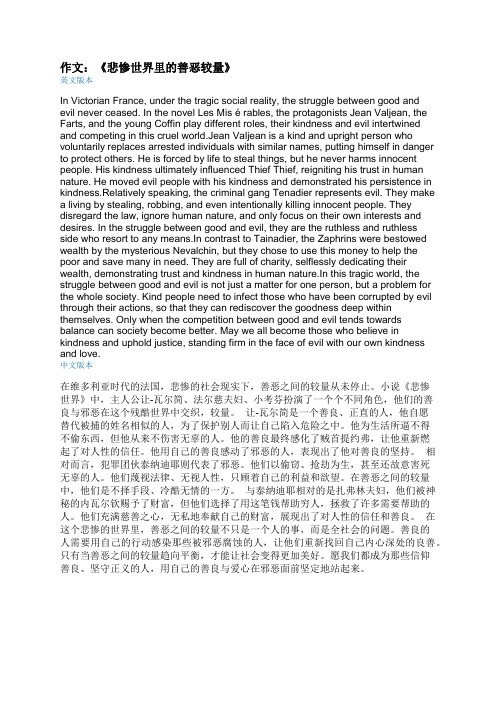
作文:《悲惨世界里的善恶较量》英文版本In Victorian France, under the tragic social reality, the struggle between good andevil never ceased. In the novel Les Mis é rables, the protagonists Jean Valjean, the Farts, and the young Coffin play different roles, their kindness and evil intertwinedand competing in this cruel world.Jean Valjean is a kind and upright person who voluntarily replaces arrested individuals with similar names, putting himself in danger to protect others. He is forced by life to steal things, but he never harms innocent people. His kindness ultimately influenced Thief Thief, reigniting his trust in human nature. He moved evil people with his kindness and demonstrated his persistence in kindness.Relatively speaking, the criminal gang Tenadier represents evil. They make a living by stealing, robbing, and even intentionally killing innocent people. They disregard the law, ignore human nature, and only focus on their own interests and desires. In the struggle between good and evil, they are the ruthless and ruthlessside who resort to any means.In contrast to Tainadier, the Zaphrins were bestowed wealth by the mysterious Nevalchin, but they chose to use this money to help thepoor and save many in need. They are full of charity, selflessly dedicating their wealth, demonstrating trust and kindness in human nature.In this tragic world, the struggle between good and evil is not just a matter for one person, but a problem for the whole society. Kind people need to infect those who have been corrupted by evil through their actions, so that they can rediscover the goodness deep within themselves. Only when the competition between good and evil tends towards balance can society become better. May we all become those who believe in kindness and uphold justice, standing firm in the face of evil with our own kindness and love.中文版本在维多利亚时代的法国,悲惨的社会现实下,善恶之间的较量从未停止。
2024年漫威语录
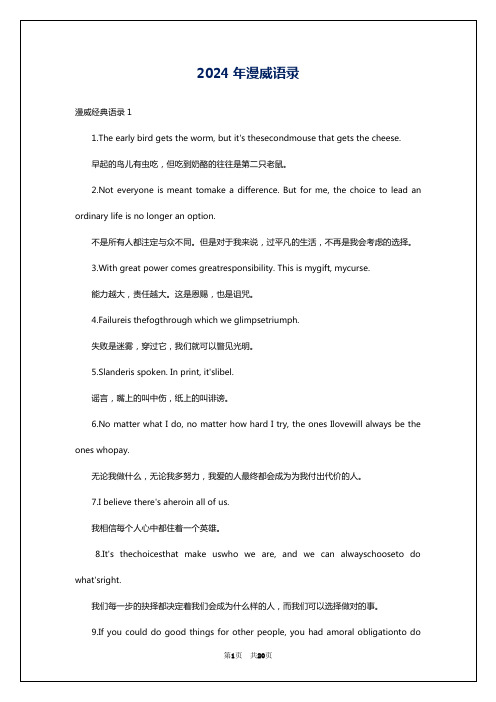
57、快乐要懂得分享,才能加倍的快樂乐。
58、强烈的信仰会赢取坚强的人,然后又使他们更坚强。
59、赚钱之道很多,但是找不到赚钱的种子,便成不了事业家。
60、成功与不成功之间有时距离很短——只要后者再向前几步。
61、大路走尽还有小路,只要不停地走,就有数不尽的风光。
13、不论事业还是个人业余爱好,锁定正确目标,持之以恒终有果。
14、当爱情不在的时候,请对他说声祝福,毕竟,曾经爱过。
15、觉得自己做的到和不做的到,其实只在一念之间。
16、在世界的历史中,每一伟大而高贵的时刻都是某种热忱的胜利。
17、事实上,成功仅代表了你工作的,成功是失败的结果。
18、若不给自己设限,则人生中就没有限制你发挥的藩篱。
6、你尽了自己的最大努力时,失败也是伟大的。
7、用自己的不懈努力,证明你一点儿也不比别人差。
8、任何业绩的质变都来自于量变的积累。
9、永不言退,咱们是最好的团队。
10、这么难的题你能回答得很完整,真是了不起!
11、有些事,明知是错的,也要去坚持,因为不甘心。
12、人不怕痛苦,只怕丢掉刚强,不怕磨难,只怕失去希望。
不是所有人都注定与众不同。但是对于我来说,过平凡的生活,不再是我会考虑的选择。
3.With great power comes greatresponsibility. This is mygift, mycurse.
能力越大,责任越大。这是恩赐,也是诅咒。
4.Failureis thefogthrough which we glimpsetriumph.
31、环境永远不会十全十美,消极的人受环境控制,积极的人却控制环境。
犯罪心理名言警句英文
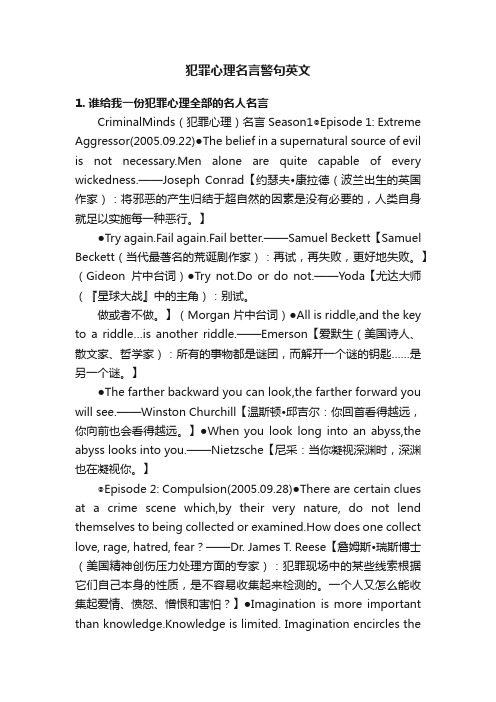
犯罪心理名言警句英文1. 谁给我一份犯罪心理全部的名人名言CriminalMinds(犯罪心理)名言Season1◎Episode 1: Extreme Aggressor(2005.09.22)●The belief in a supernatural source of evil is not necessary.Men alone are quite capable of every wickedness.——Joseph Conrad【约瑟夫•康拉德(波兰出生的英国作家):将邪恶的产生归结于超自然的因素是没有必要的,人类自身就足以实施每一种恶行。
】●Try again.Fail again.F ail better.——Samuel Beckett【Samuel Beckett(当代最著名的荒诞剧作家):再试,再失败,更好地失败。
】(Gideon片中台词)●Try not.Do or do not.——Yoda【尤达大师(『星球大战』中的主角):别试。
做或者不做。
】(Morgan片中台词)●All is riddle,and the key to a riddle…is another riddle.——Emerson【爱默生(美国诗人、散文家、哲学家):所有的事物都是谜团,而解开一个谜的钥匙……是另一个谜。
】●The farther backward you can look,the farther forward you will see.——Winston Churchill【温斯顿•邱吉尔:你回首看得越远,你向前也会看得越远。
】●When you look long into an abyss,the abyss looks into you.——Nietzsche【尼采:当你凝视深渊时,深渊也在凝视你。
】◎Episode 2: Compulsion(2005.09.28)●There are certain clues at a crime scene which,by their very nature, do not lend themselves to being collected or examined.How does one collect love, rage, hatred, fear?——Dr. James T. Reese【詹姆斯•瑞斯博士(美国精神创伤压力处理方面的专家):犯罪现场中的某些线索根据它们自己本身的性质,是不容易收集起来检测的。
丘吉尔二战著名演讲
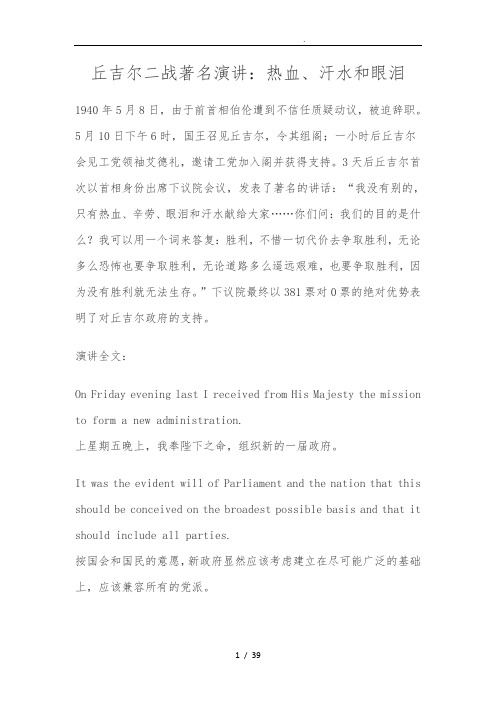
丘吉尔二战著名演讲:热血、汗水和眼泪1940年5月8日,由于前首相伯伦遭到不信任质疑动议,被迫辞职。
5月10日下午6时,国王召见丘吉尔,令其组阁;一小时后丘吉尔会见工党领袖艾德礼,邀请工党加入阁并获得支持。
3天后丘吉尔首次以首相身份出席下议院会议,发表了著名的讲话:“我没有别的,只有热血、辛劳、眼泪和汗水献给大家……你们问:我们的目的是什么?我可以用一个词来答复:胜利,不惜一切代价去争取胜利,无论多么恐怖也要争取胜利,无论道路多么遥远艰难,也要争取胜利,因为没有胜利就无法生存。
”下议院最终以381票对0票的绝对优势表明了对丘吉尔政府的支持。
演讲全文:On Friday evening last I received from His Majesty the mission to form a new administration.上星期五晚上,我奉陛下之命,组织新的一届政府。
It was the evident will of Parliament and the nation that this should be conceived on the broadest possible basis and that it should include all parties.按国会和国民的意愿,新政府显然应该考虑建立在尽可能广泛的基础上,应该兼容所有的党派。
I have already completed the most important part of this task.A war cabinet has been formed of five members, representing, with the Labor, Opposition and Liberals, the unity of the nation. 我已经完成了这项任务的最主要的部分。
战时阁已由五人组成,包括工党、反对党和自由党,这体现了举国团结一致。
苏格拉底的英文名言
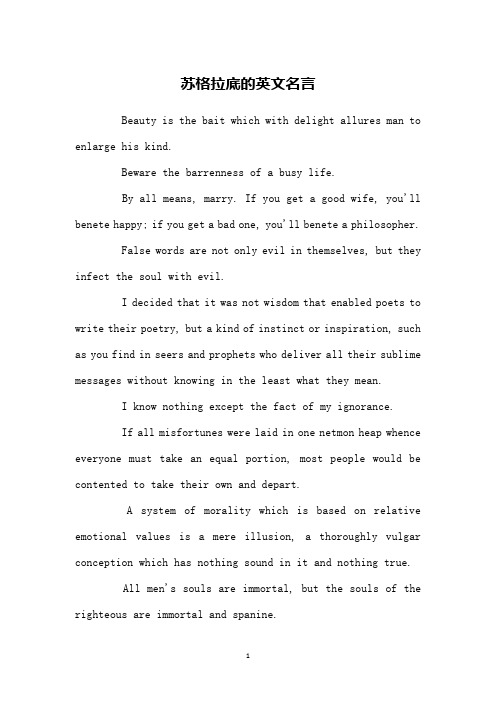
苏格拉底的英文名言Beauty is the bait which with delight allures man to enlarge his kind.Beware the barrenness of a busy life.By all means, marry. If you get a good wife, you'll benete happy; if you get a bad one, you'll benete a philosopher.False words are not only evil in themselves, but they infect the soul with evil.I decided that it was not wisdom that enabled poets to write their poetry, but a kind of instinct or inspiration, such as you find in seers and prophets who deliver all their sublime messages without knowing in the least what they mean.I know nothing except the fact of my ignorance.If all misfortunes were laid in one netmon heap whence everyone must take an equal portion, most people would be contented to take their own and depart.A system of morality which is based on relative emotional values is a mere illusion, a thoroughly vulgar conception which has nothing sound in it and nothing true.All men's souls are immortal, but the souls of the righteous are immortal and spanine.Envy is the ulcer of the soul.Our prayers should be for blessings in general, for God knows best what is good for us.The poets are only the interpreters of the Gods.Worthless people live only to eat and drink; people of worth eat and drink only to live.Remember that there is nothing stable in human affairs; therefore avoid undue elation in prosperity, or undue depression in adversity.。
- 1、下载文档前请自行甄别文档内容的完整性,平台不提供额外的编辑、内容补充、找答案等附加服务。
- 2、"仅部分预览"的文档,不可在线预览部分如存在完整性等问题,可反馈申请退款(可完整预览的文档不适用该条件!)。
- 3、如文档侵犯您的权益,请联系客服反馈,我们会尽快为您处理(人工客服工作时间:9:00-18:30)。
课程名称:希腊罗马哲学专业年级:______ _国际经济与贸易 2014年级学号:_ __3140300346______学生姓名:______尼可(留学生)___论文题目:__Beyond good and evil: Prelude to a Philosophy of the futureBeyond Good and Evil: Prelude to a Philosophy of the FutureFRIENDICH NEITZSCHEThe very title of this work indicates that Nietzsche puts an end to the ethics, rejecting its basic concepts and especially the opposition between good and evil, the consideration of the good as the principle of morality. "We immorality," he says. This "we" is not quite clear, because Nietzsche alone, he has no supporters, it is therefore not the head of a group of like-minded people. And yet this "we" is no accident. Royal decrees began with the words: "We..." do Not imitate Nietzsche's Royal etiquette? Nietzsche, who was proud that he was named after the Prussian king was also aware of himself as a king in the realm of the spirit. And his judgments, like Royal decree, do not require justification. Morality, he explains, becomes a problem because there are many morals. Therefore every morality inevitably narrows the term, i.e. the opportunity to consider the phenomenon from different angles, from different perspectives, since perspective can always be changed. But if you have a morality, it means that there are moral phenomena. However, contrary to this, Nietzsche asserts: "No moral phenomena, only moral interpretation of phenomena" (2, 296). Moral interpretation however it may be understood Nietzsche, there are, of course, a moral phenomenon.And his judgments, like Royal decree, do not require justification. Morality, he explains, becomes a problem because there are many morals. Therefore every morality inevitably narrows the term, i.e. the opportunity to consider the phenomenon from different angles, from different perspectives, since perspective can always be changed. But if you have a morality, it means that there are moral phenomena. However, contrary to this, Nietzsche asserts: "No moral phenomena, only moral interpretation of phenomena" (2, 296). Moral interpretation however it may be understood Nietzsche, there are, of course, a moral phenomenon. This follows in particular from the "ontology" of the philosopher, according to which there are not facts, but interpretations.Hence a moral interpretation of phenomena that are themselves interpretations, there is nothing like morality, although it acts in this case as the interpretation of interpretation. However, in the same work Nietzsche speaks of morality as a fact. It is not surprising, therefore, that the subjectivist understanding of morality, which is a retelling of the teachings of Schopenhauer of the world as representation, does not prevent Nietzsche to describe morality as a spiritual condition, signs of which exist objectively. Communities, peoples, States, churches are, according to him, the species herd status and the corresponding morality: "Morality in Europe today is herd animal morality" (2, 320). But the "herd morality" - the morality of most people is not the only morality. Requirement of one morality for all is ridiculous. "There is a morality of masters and morality of slaves" (2, 381). Thus Nietzsche, who repeatedly argued that morality does not exist, i.e. is only a superstition, and proves in this work, despite its title ("beyond good and evil"), the need for a higher morality, believing that it may be peculiar only to the aristocrats of the spirit. The ambivalence of this, at first glance, the new statement of ethical problems, not in the least understood philosopher not only because of the subjectivity of his philosophizing, but also because he does not believe a logical sequence, free from incompatible proposals, whatever dignity*. What is the subject of this higher morality? Nietzsche is talking here about Superman, but it still goes on the person of the highest kind.In this context, is formulated moral ideal: "to Live, maintaining a monstrous and proud tranquility; always beyond? - Seem to have their affects, their "for" and "against", or not to have them... And to be master of their four virtues: of courage, insight, sympathy, solitude" (2, 398). The moral ambivalence of this credo is evident. How can you be always beyond good and evil, if Nietzsche had already chosen his moral stand, calling the Supreme morality and so refused to actually state in the same work of immoralist? How can we talk about the arbitrariness in relation to its affects, if Nietzsche denies freedom of choice and freedom of will at all? Is it possible, bearing in mind the views of Nietzsche, considered compassion a virtue? After all, can be sympathy and compassion, which is constantly up in arms against Nietzsche, attributing compassion, selfishness, and other vices. It is significant that Nietzsche believes that virtue alone.His aversion to "herd"consciousness is in general a misanthropic, to put it mildly, attitude towards people. This has already been discussed in the previous sections of this chapter. Probably, this hostile attitude towards others is to a certain extent explained by his morbid condition. To this must be added and such an important circumstance: the books of Nietzsche almost throughout his life are not in demand not only among readers, but also among professional philosophers, historians, psychologists. Nietzsche very painfully experiences the indifference of readers and the publishers complaining that his books do not attract buyers. He tries to console himself, arguing that only mediocrities, possessing a certain dexterity, resourcefulness, gain success with the reading public. But in addition to mediocrity, there are also geniuses who enjoy universal recognition. Nietzsche admires the poetry of Goethe, Byron, Heine, and Dostoyevsky's novels. This admiration is inseparable from bitterness: after all, no one recognizes him, also genius. Hence it is clear not only Nietzsche and loneliness as a fact, but also his glorification of loneliness as virtues. "Do not become attached to the person, even to the most beloved, - every person is a prison, as well as an angle.Attached to the Fatherland, even to the most suffering and in need of assistance... Not to cling to compassion, though it were of the highest people... Not to get attached to science, even though she was attracted to a person dearest, and apparently, we saved finds. Not to get attached to my own liberation... Not to get attached to our own virtues..." (2, 273). Briefly express the meaning of this imperative, he says one thing: to live in society, but be free from it. But society is not only a few directly surrounding the philosopher people. Society is the interaction between a huge numbers of people, is a diverse public relations, both material and spiritual. Society - the Foundation and source of all inherent individual abilities, needs, knowledge and skills. Even all his features including his genius - is also a social product, a cultural phenomenon that does not exclude the initiative of the individual, his perseverance in the realization of your calling and the ensuing objectives. Nietzsche, of course, realized that the loneliness, - as he understood it, is unattainable and, in fact, undesirable. But he sought to be alone, craving public recognition of his genius. Of course, the ambivalence of the above provisions, like other aphorisms of Nietzsche, is not subject to correction by the defect. On the contrary, it largely overcomes the one-sidedness, extravagance, shockingutterances of the philosopher, who corrects himself, not realizing it. Therefore, the negation of "moral phenomena", i.e. immoralist, is compensated by the recognition of higher, authentic morality. However, purely one-sided nits - Rzewski features of everyday morality as herd consciousness does not overcome the opposite proposition about a higher morality, which, according to Nietzsche, inherent only to a few, exceptional people. It just shows that not always Nietzsche makes concessions for himself at least in order to clarify a particular position. Some of his sayings Nietzsche put it beyond any criticism. These are primarily "aristocratic" views of the philosopher, aristocratic in quotes because we are talking about a spiritual aristocracy However, the name is accompanied by the subtitle "Prelude to a philosophy of the future", which indicates that no questions of morality, and the question about the fate of philosophy is Nietzsche. He denies all previous philosophy, reducing all its content to the dogmas and the dogmatic method of philosophizing. Not included in the analyses of dogmatism, its significantly different from each other forms (ancient philosophy, medieval European scholasticism, the philosophy of the New time is quite different in this respect from each other), he strongly opposes systematically, rightly condemning it as "a noble childishness". It is known that any distinguished philosopher, created his system as a system of complete knowledge, not subject to any kind of review, and especially further development. The system, which should be distinguished from the systematic presentation of content, inevitably doomed every philosophical doctrine to be defeated, which remained, at best, only some basic ideas that are independent of the fact that they gave complete. Nietzsche is not limited to criticism of systematically. He sees dogmatism also in the fact that the doctrines proclaimed as self-sufficient truths, despite the fact that they were not previously questioned. Indicative of this, in his opinion, Plato's theory of transcendent ideas and the good as the highest good in the afterlife. "Talk about spirit and the good as Plato says, it means, no doubt, to put the truth upside down and denying the very prospect, i.e. the basic condition of all life..." (2, 240). There is no self-knowledge, under the banner of which are philosophers. There can be a self-pursuit of knowledge. Philosophy is generated, the conviction of Nietzsche, one of the inherent human instincts, which is knowledge as a means to achieve goals unrelated to cognition, independent of him. This rootedness ofphilosophy in non-philosophical, is not a cognitive activity, can't you see don't want to see philosophers. Therefore, they argue that philosophy is generated by a tireless thirst for truth, inherent to the human being curiosity.It is the belief of the philosophers is not just an illusion or delusion. Illusions and delusions necessary, useful, fruitful. Philosophical views are not only theoretically untenable, but also malicious. Equally untenable and detrimental characteristic of philosophy contraindication truth to the illusions and misconceptions. Illusion and delusion that are "revealing" philosophers, in fact, not less valuable than the truth. Perhaps even more valuable. "With all values, what can pertain the true, the truthful, unselfish, it is still possible that illusion, the will to deception, selfishness, and lust must be assigned a higher and more unquestionable value of all life" (2, 242). The belief that truth is more important than illusion, is characterized by Nietzsche as moral prejudice. Illusion, delusion inherent in life, which, in essence, nothing to do with the truth. The lies that philosophers reviled as being unacceptable, malicious, and harmful in all respects, in fact, is the most important prerequisite of life. "To recognize the lie for the condition on which depends the life, is of course risky way to resist the usual sense of the value of things, and philosophy brave enough for it, puts himself has one that is beyond good and evil" (2, 243). Thus, the traditional belief in the truth of its superiority over the misconception is, from the point of view of Nietzsche, pernicious delusion than those misconceptions that need life, a person needs to survive no matter what. However, Nietzsche distinguishes between useful and harmful misconceptions. The truth, in which all previous philosophy had only seen good, often turns out to be harmful, dangerous, real threat of life itself, he says. That is why the knowledge of a life fraught with mortal danger, and sometimes even just death. Human intelligence ought to measure that portion of the truth which it can stand. The proportion of this, typically small. Nietzsche, exposing a witty criticism of the juxtaposition of truth and error, however, cannot actually abandon this opposition the only difference is that he takes under the protection of the fallacy, claiming that it is more necessary to life than truth. But he, in spite of this opposition, abolishes the contrast between truth and error. In place of opposites is the distinction, but this distinction between truth and error there is a differenceonly in the degree of illusion. Imaginary — this is what characterizes not only the life but knowledge. Should not, therefore, to attribute to science the pursuit of knowledge of the truth. A scientist, of course, as a rule, I am convinced that this is the task of science and of his own task. This self-deception that fuels and supports science, should not take philosophy seriously. Philosophy seeks always and everywhere to reveal the imaginary as the primary definition of reality. "Whichever philosophical point of view were we now, from all sides is the kind of world in which we think we live is the most loyal of just what else might catch our eyes..." (2, 268). All of this relates to the external world, which, from this point of view, there are already external. Subjectivist considerations of Nietzsche is obvious not only to the reader but to the philosopher who is not inclined, of course, to solipsism. Therefore, he insists that it is not only imaginary. Authentic and what is imaginary. It is reliable is rooted in our senses. Sensitive data is irrefutable. He even argues that sense data comes from the "any evidence of the truth." Sensationalism, in his opinion, should be adopted as a "guiding hypothesis." Of course, the sensationalism can also be made subjectivist insights bordering on solipsism. Nietzsche is well aware of this danger. So he writes: "with a clear conscience to do physiology, you need to assume that the sense organs are not phenomena in the sense of idealistic philosophy... some say even that the external world is like the creation of our bodies.But then our body, as part of this external world, would be the creation of our bodies... Therefore, the outside world is not a creation of our bodies" (2, 251-252). This provision may not agree 235 is only an objective idealist, but a materialist, of course, if not to bring the outside world to the imaginary. Nietzsche is not a supporter of either materialism or idealism that allows him to make the situation as acceptable and unacceptable these philosophical directions, and thus, to rise (apparently) on these contrasts and on all sorts of "isms" in General. This philosophical position could be called eclectic, but eclecticism is not inherent in the philosophy of Nietzsche, as it is a collection of fragments, aphorisms, which are logically connected to each other, can swap places and can be removed from the text without any change of the meaning of its content. In this kind of dignityof Nietzsche's philosophy, which declares the various, often incompatible views,each of which becomes more meaningful when it is supplemented by an opposing philosopher? However, despite the diversity expressed by Nietzsche provisions can be concluded that in the end he inclined to skepticism. "Let not mistaken the great minds - skeptics. Zarathustra is a skeptic. The fortress of freedom resulting from spiritual power and its excess, proved to skepticism" (2, 680). A radical negation of previous philosophy (with the exception of... philosophy of Schopenhauer and skepticism) is the basis of the conclusion about the necessity of a new type of philosophy, philosophy of the future, according to Nietzsche. About the content of this philosophy is stated very sparingly and definitely not enough. The philosophers of the future will be the masters and creators, the creators of new values. They become the "evil conscience of his time" (2, 336). This thesis should, apparently, be understood in the sense that the new philosophers will act as the ruthless criticism of all that exists, denying all temporary, transient, every "now". The philosophy of the future will be independent of her time, she would confront him. The philosopher as "a man bearing great responsibility with conscience, which fits the overall development of man - this philosopher will make use of religions for the purposes of disciplining and upbringing the same way as other political and economic conditions" (2, 287). This position of Nietzsche shows that the new approach to religion.Not in the sense that he refuses to atheism. No, he remains an atheist, but now it is politically suitable to religion and begins to see in it the means of spiritual subjugation of masses of people.The philosopher of the future, from his point of view, cannot be a politician. Needless to say, I do not mean just the current policy with its limited private purposes. The philosopher of the future with contempt for the political routine, small things. "Time for small politics is gone: already the coming century carries with him the struggle for supremacy over the entire globe - the compulsion to great politics" (2, 332). Nietzsche, therefore, fully aware that the ruling powers of his time striving to dominate the world. His attitude to this desire is rather positive than negative. In any case, it is the great policy, the goals of which, however, as yet nothing more is said. The work "beyond good and evil" is characterized by some researchers of the teachings of Nietzsche as a radicalturning point in terms of transition to a new circle of ideas. In my opinion, for this assessment there was insufficient evidence. With the exception of the thesis of the great policy, all other provisions, in some formulation or other, had already met in the previous works of Nietzsche, part of even the earliest.。
